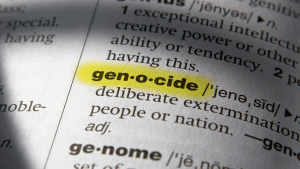This story is made possible through Votebeat’s collaboration with Spotlight PA and its Elections 101 series, protecting you against election misinformation and empowering you to make informed decisions.
In 2020, former President Donald Trump’s campaign paid $3 million so Wisconsin would recount votes in two counties.
The result: Joe Biden’s lead grew by 87 votes.
Such a recount would not be possible in Pennsylvania. Here, a recount is automatically ordered if a statewide race falls within a certain margin. Voters can also initiate recounts in their own precincts.
With another highly contentious rematch between the two on the table for this November, an automatic recount cannot be ruled out. In recent years, supporters of losing candidates have also initiated precinct-level recounts that have little chance of changing a race’s outcome but can be used to disrupt the election process.
Here is what you need to know about how recounts work in Pennsylvania:
Why do recounts happen in Pennsylvania?
There are at least two ways a recount can be initiated in Pennsylvania.
Under Pennsylvania law, a recount is automatically triggered for a statewide race if the margin of victory lies within half a percent, and the state and counties pay for the effort. This last happened in the 2022 primary race for the Republican U.S. Senate nominee.
Three voters in a precinct can also request a recount based on their belief that fraud or error occurred. Such a recount only affects ballots cast in the voters’ precinct, which is the smallest voting district, usually just a few hundred voters and sometimes no larger than a city block.
The fee to request such a recount is $50, a price set in 1927 with an equivalent value of $900 today. Critics of Pennsylvania’s nearly 100-year-old election law say this provision makes the state vulnerable to weaponized precinct-level recounts that can delay certification, and argue it should be updated to reflect inflation. Such petitions delayed the certification of the 2022 election.
READ: Voting Rights Groups File Lawsuit to Challenge Pennsylvania Mail-in Ballot Date Requirement
In 2016, supporters of Green Party presidential candidate Jill Stein filed such requests. In court, Stein requested a full recount, arguing the contest had been marred by voting machines susceptible to hacking. She eventually dropped the recount effort after a judge ordered her to post a $1 million bond to cover the cost.
Adam Bonin, a Philadelphia-based attorney who regularly works with Democratic candidates, said he has used precinct-level recount requests before for local races for township supervisor or school board.
In 2023, the Pennsylvania Supreme Court upheld a lower court’s ruling that for a recount to be granted, the petitions either need to be filed in all of the precincts where a race takes place or present some kind of evidence of fraud or error. That ruling set a precedent for the whole state.
That barrier is low for races like township supervisor, which may have just a handful of precincts. But for statewide races that would mean filing petitions in all of the state’s more than 9,000 precincts.
How does Pennsylvania recount votes?
Counties must submit their unofficial results to the Pennsylvania Department of State by the first Tuesday following the election, which is Nov. 12 this year. If unofficial results show the margin lies within half a percent for a statewide race like those for president or U.S. Senate, the secretary of the commonwealth will order a recount by Nov. 14, according to a Department of State directive. A losing candidate has until Nov. 13 to request a recount not take place.
Counties will then recount all ballots either by hand or using different tabulation machines than the election was initially conducted with.
The recount must begin by the third Wednesday following the election, which this fall will be Nov. 20, and results must be submitted to the secretary by the following Wednesday, Nov. 27.
In the case of precinct-level recount petitions, requesters must file their petition with the local Court of Common Pleas. A judge will then determine if it meets the legal requirements to take place.\
Can a recount change election results?
Recounts that change the outcome of a race are extremely rare, according to a study of statewide recounts by Fair Vote, a nonprofit focused on ranked-choice voting.
The group analyzed nearly 7,000 statewide races between 2000 and 2023, and found only 36 recounts in that time, only three of which resulted in a change of outcome.
“All three reversals occurred when the initial margin was less than 0.06% of all votes cast for the top two candidates,” according to the report.
READ: The Fear of Noncitizen Voting Is As Baseless As It Has Been for 200 Years
According to the Pennsylvania Department of State, there have been seven statewide recounts since the 0.5% rule went into effect in 2004, and none of them changed the outcome of the race.
The most recent was in the 2022 Republican primary for U.S. Senate.
In that race, Mehmet Oz beat Dave McCormick by 902 votes — a margin of 0.07% — triggering the recount. McCormick conceded before the recount was complete, but the count ultimately shifted the margin by only 49 votes, in Oz’s favor.
Voter-initiated precinct-level recounts are even less likely to affect the outcome of a race than those ordered by the secretary.
In 2022, when supporters of Republican gubernatorial candidate Doug Mastriano requested recounts around the state, they did not substantially shift the margin in areas where the requests were granted.
Recounts in four Westmoreland County precincts resulted in only a three-vote difference from the original tally. Columbia County also recounted votes in some precincts, and results changed by only one or two votes, officials said at the time.
Could there be a recount this year?
Whether there is an automatic recount of a statewide race this year depends on the margins of victory this November. Current polling indicates the presidential race may be close in Pennsylvania.
If the margin is within half a percent, Secretary of the Commonwealth Al Schmidt must order a recount by Nov. 14, according to a calendar of this year’s election. Counties would need to submit the results of that recount to the secretary by Nov. 27.
READ: Elections 101: How Pennsylvania Secures Mail Ballots, Prevents Fraud, and More
It’s likely at least some voters will request precinct-level recounts, which could negatively affect the state’s certification process. This year, there is a hard deadline for Pennsylvania to provide its certified slate of presidential electors to Congress.
If precinct-level recount petitions delay certification as they did in 2022, the state could run up against that deadline and the courts may be forced to intervene.
This article was originally published by Votebeat, a nonprofit news organization covering local election administration and voting access. Sign up for their free newsletters here.







